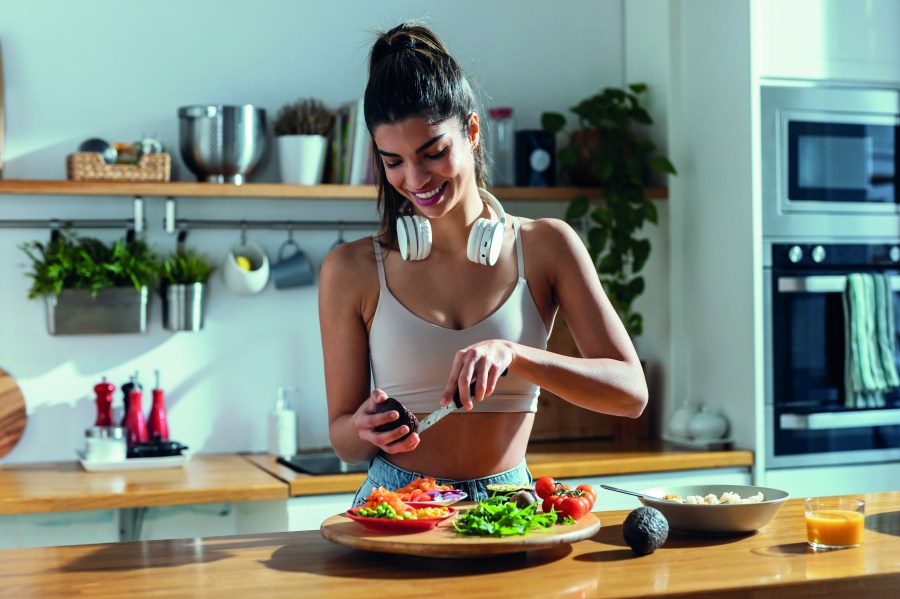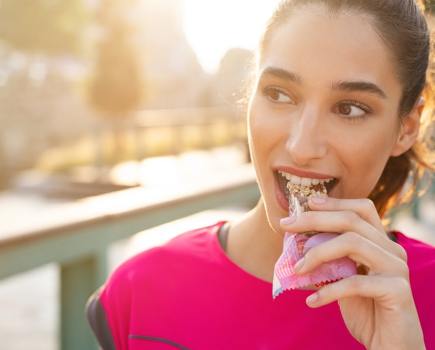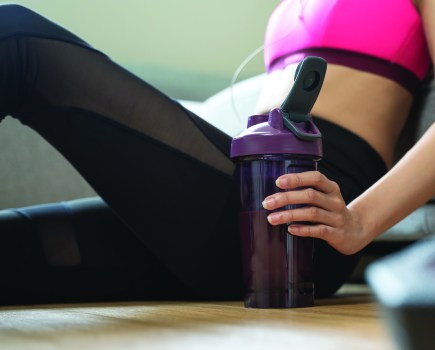Frantically packing meals for the day ahead is a sure-fire way to stress you out! Batch-cooking – or meal prepping – ensures there’s always a nutritious option to hand. Lucy Miller shares how to meal prep and master it.
As the old adage goes, failing to plan is planning to fail, but ‘meal prepping’ isn’t a faddy trend – it’s long been a popular way for those wanting to simplify and prepare healthy, balanced meals on a budget and to a busy schedule.
Sure, planning and cooking your meals for the week ahead can sound pretty daunting, but the benefits are off-the-scale. Imagine opening your fridge after a long day and seeing an array of neatly packed containers filled with macro-friendly deliciousness just waiting to be devoured. There’s no need for a takeaway, no need for any chopping, and no need to decide what you’re going to eat – it’s all there waiting for you.
Sound good? Here, our experts share their top tips on how to plan your meals and organise your food and kitchen, so you not only reach your goals but also transform food prep chaos into culinary bliss.
How to meal prep
“Plan and calculate” –  Dame Jessica Ennis-Hill
Dame Jessica Ennis-Hill
Dame Jessica Ennis-Hill, Olympic champion and Sleepeezee brand ambassador (sleepeezee.com)
‘I’m a very organised person, and I know from experience that when you set out new nutrition and fitness goals, one of the best ways to stick to and achieve them is to write everything down and have a plan. When planning, think about your specific training goal and how a healthy food plan could support it. You then need to plan how many breakfasts, lunches, snacks and dinners you’ll need throughout the week, which, technically, if you want enough for the working week, is 15 meals. This doesn’t mean you need to cook 15 separate dishes, though. Instead, prepare a few large batches of breakfast, lunch and dinner that can be used in various ways throughout the week to fuel your body and help maximise your fitness potential.’
“Chop ahead of time” –  Briar Pitt
Briar Pitt
Briar Pitt, physiotherapist, bikini athlete and ambassador for lifestyle and mental health app, FDD1 (fdday1.com)
‘Chop up fruit and vegetables, or anything else you like to add to a smoothie or protein shake, and freeze in individual plastic bags. In the morning (or at snack time), all you need to do is unpack them and add to a blender such as the Ninja Blast Cordless Blender (£49.99, ninjakitchen.co.uk). Frozen, chopped bananas are especially amazing – they not only cool the smoothie like ice cubes do, but also make your shake thick and creamy!’
“Makeover your mindset” – 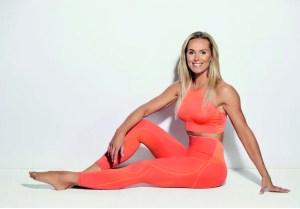 Sarah Lindsay
Sarah Lindsay
Sarah Lindsay, ex-Olympic athlete, trainer to the stars, and owner of Roar Fitness (roar-fitness.com)
‘Try to do your shop and meal prep on a Sunday, so throughout the week you can grab and go. Yes, chopping, marinating, baking and boiling can feel like a chore, but once you change the narrative and think of meal prepping as “me time”, it feels so good. Try listening to music or catching up on some Netflix. Hours of meal prepping can be treasured time that can be enjoyable and beneficial at the same time.’
“Don’t forget snacks” –  Amelia Murs
Amelia Murs
Amelia Murs, fitness model and Miami Pro World fitness champion.
‘Don’t just prep your main meals. Get organised with healthy snacks, too. This helps me to stay on track between meals and is one less thing to think about when I start to get hungry. For ease, buy a bunch of bananas, so you have one set aside each day to take to work. You can also slice up an apple and have it with a dollop of peanut butter, or have some carrots and houmous. I also like to weigh out around 30-50g of mixed nuts and take them in a pot so I can graze on them throughout the day.’
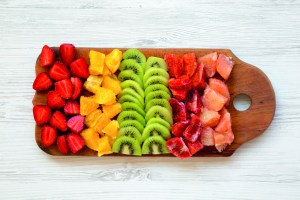
“Stick to what works” –  Jen Bailey-Hobbs
Jen Bailey-Hobbs
Jen Bailey-Hobbs, wellness advocate, breathwork instructor and founder of Seedlings Retreats and Holidays (seedlingsretreatsandholidays.com)
‘Samey, samey… just know that it’s more than okay to have the same meal more than once a week. I tend to have the same breakfast, same lunch, same supper and same snacks daily for around seven days, and then I change them ahead of a new week. Not only does this keep things simple but it’s helped remind me that food is fuel and that careful choices of healthy, nutritious meals are always ready and waiting for me. Prepping my meals this way makes meals easy to navigate with no waste,
no changing my mind or food temptation. My menus have been set and that’s what I stick to.’
“Keep meals simple” – Korin Nolan
Korin Nolan
Korin Nolan, founder of Power Pilates UK (powerpilatesuk.com)
‘Don’t over complicate things with a long list of ingredients, and always have a portion of protein with every meal. My go-to lunch consists of pouring a drizzle of olive oil mixed with lemon, salt and pepper into the bottom of a clip-top glass jar. I’ll then layer with a cup of chickpeas, a can of tuna, chopped cucumber, chopped tomatoes and a yellow or red pepper. All I need to do then is tip it out into a bowl or onto a plate, and stir. And if don’t eat it all in one go, I’ll save the rest for later. It’s important to look forward to eating, and carrying this colourful layered jar feels really fun and is nutritious, too.’
“Stock up on storage” –  Mhairi Keil
Mhairi Keil
Mhairi Keil, performance nutritionist and lead female health nutritionist at Marylebone Health (marylebonehealthgroup.com)
‘Meal prepping often requires ample storage space in your refrigerator or freezer. It’s also essential to have enough suitable
food containers (ideally bisphenol A-free) that can reliably preserve the freshness of your meals, such as the Zwilling Glass Vacuum pot (from £11.95, zwilling.com) or the Brabantia Make & Take Insulated Lunch Pot (£24.95, brabantia.com). And be sure to keep track of what needs to be eaten and when, to avoid confusion and spoilage. It’s a waste of your time and energy if you are making your meals but they aren’t being consumed within their recommended time frames, or aren’t stored correctly.’
“Buy in bulk” – 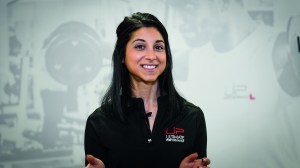 Aroosha Nekonam
Aroosha Nekonam
Aroosha Nekonam, certified personal trainer at Ultimate Performance (ultimateperformance.com)
‘Buying your protein in bulk from places such as Muscle Food (musclefood.com) and Meat In Box (meatinthebox.com) will make meal prepping more cost-effective. To prep, dice up some raw chicken, beef, fish or whatever your protein preference, and weigh it out into zip-lock bags before freezing. You could even marinate them like this, too. Frozen vegetables are also fantastic when it comes to meal prep and avoiding food waste, and, because they are picked fresh and flash-frozen, they retain a lot of the nutrients that fresh vegetables can lose on the shelf.’

